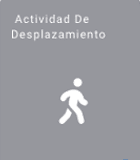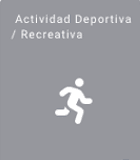Physical Activity
Your physical activity is made up of three types of Activity. In each one you can enter data depending on the type of Activity and the level of effort you put into each one. The number of days and time you spend on each activity will allow us to measure your METS, which refers to the variable that determines whether your physical activity is adequate. Click on the type of activity to see examples and learn more about each section within Physical Activity.
What are METS
METS, which measures the intensity of your physical activities, is the variable we use to determine the impact of your physical activity at work on your health status. METs is a Metabolic Equivalent and is equivalent to the amount of Oxygen that we usually consume while we remain seated and that is why any physical activity can be defined as a measure of the amount of oxygen demanded from us when we execute it.
In your health indicators related to physical activity, you will be able to evaluate the impact of these activities on your health status based on the number of METS. It's worth noting that the three types of activity(Work, Commuting, and Sports) add up to the Total METS for your Total Physical Activity.
Activity at work
Your work activity may have different levels of effort:
- Low Activity. For example, office work - at desk.
- Moderate Activity.These are activities that may make you breathe a little heavier than normal but allow you to talk while doing them. See examples.
- Vigorous Activity. These are activities that make you breathe harder than normal and don't allow you to talk while you're doing them. See examples.
For each level of effort within the work activity you can record the following data:
- How many days a week do you engage in this type of activity.To answer this question consider the examples for each level of activity mentioned above and indicate how many days a week you do this activity.
- On the days you do this activity, how much time do you spend on it.To answer this question consider the average time you spend on this activity on each day you do it.
Examples of Moderate Work Activity
Cleaning activities
Washing a car
Gardening activities
Milking cows
Planting seeds
Carpentry
Attending farm animals

Examples of Vigorous Work Activity
Tree cutter
Plough
Construction Worker
Chargers
Spinning Instructors
Aerobics Instructors
Bicycle delivery person

Displacement Activity
Sometimes moving from one place to another also involves physical exertion, which can contribute to your overall physical activity. You can enter information considering three levels of commuting activity:
- Walking.
- Climbing Stairs
- Transporting yourself by bicycle.
For each level of travel activity you can record the following data:
- How many days a week do you dedicate to this type of activity. To answer this question, consider the number of days you commute or transport yourself in this way.
- On the days you do this activity, how much time do you spend on it. To answer this question consider the average time you spend on this commuting activity on the days you do it.
Sports / Recreational Activity
Your sport or recreational activity may have different levels of exertion:
- Moderate Activity.These are activities that may make you breathe a little harder than normal but allow you to talk while you do them. See examples.
- Vigorous Activity. These are activities that make you breathe harder than normal and don't allow you to talk while you're doing them. See examples.
For each level of exertion within the sport or recreational activity you can record the following data:
- How many days a week do you engage in this type of activity. To answer this question consider the examples for each level of activity mentioned above and indicate how many days a week you do this activity.
- On the days you do this activity, how much time do you spend on it. To answer this question consider the average time you spend on this activity on each day you do it.
Examples of Moderate Sports/Recreational Activity
Riding a bike
Jogging
Low-impact aerobics
Yoga
Riding a horse
Pilates
Tai-chi
Dance

Examples of Vigorous Sports/Recreational Activity
Sport Cycling
Soccer
Rugby
American Football
Tennis matches
High-impact aerobics
Intense dancing
Competitive Swimming
Track and field







